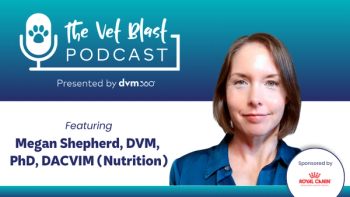
Implementing a senior care program in your practice (Proceedings)
A Senior Care Program provides a proactive comprehensive health care platform that addresses the older patient's special needs in a marketable package.
A Senior Care Program provides a proactive comprehensive health care platform that addresses the older patient's special needs in a marketable package. This specialized medical service allows you to increase the standard of care you provide your senior patients. The program is based on two premises; first there are fundamental differences in the specific diseases, behavior problems, and the nutritional needs of the older pet; secondly that prevention, early detection, and timely intervention of medical problems can have a significant impact on the longevity and quality of life of an older pet. Recently the AAHA came out with Senior Care guidelines. A copy can be found on their website;
Senior Care changes the way veterinarians traditionally approach the senior pet. Senior Care is a more inclusive health care program starting at seven years of age and advocating twice-yearly evaluations. However, the major benefit of Senior Care is the Industry support form companies like IDEXX, IAMS and Fort Dodge. IDEXX 's continued commitment to the program provides your practice with age related in house and referral laboratory diagnostics plus all the marketing and implementation tools necessary to make Senior Care successful in your practice. Tools for client education, health data gathering and health reporting tools, patient diagnostic and management charts plus program implementation tips are currently available.
Why build a Senior Care program in your practice? By advocating more comprehensive histories, performing more complete physical examinations, and recommending more diagnostic testing of older pets, you are providing higher quality veterinary medicine for your senior patients. A great deal of professional satisfaction for you and your staff comes from helping those long established senior patients live longer healthier lives. Plus managing most age related disease in the early phases is far more rewarding than the "end stage". Senior Care can be a major profit center for your practice. With over 39% of the pet population considered seniors, tremendous financial opportunities exist.
While the veterinary profession has been very successful at providing comprehensive health care programs for the puppies and kittens, there are almost 2 1/4 times as many senior pets as puppies and kittens and dogs are puppies for one year but are seniors for four to ten years. By taking a more detailed history on the senior pet, performing a more complete physical examinations, and submitting more diagnostic tests, not only are you increasing the standard of care you provide your senior patients, but approximately 40% of those patients will now require additional diagnostic testing, medication or therapy. Ultimately a properly implemented Senior Care program can represent 35% or more of your gross annual income.
A Senior Care program implies both a preventative and comprehensive therapeutic approaches to management of acute and chronic conditions in aging dogs and cats. The program emphasizes client education, prevention, early detection, and timely medical intervention.
Four Essential Components Of Any Senior Care Program Should Include;
1. Preventative Health programs
2. A comprehensive patient health assessment (discovery)
3. A formal review period where all the findings are communicated to the owner and
4. A formulating specific short & long term action plans A scheduled follow-up
I. Health Assessment:
When implementing a Senior Care program, a critical decision each practice must make is establishing the boundaries of the recommended health assessment. Exactly how detailed the history should be? Which diagnostic tests should be included in the health assessment? The ultimate programmatic decision is based on several interrelated factors including patient age, presence or absence of disease, current medications, and client resources. Most hospitals use a basic screening strategy however others employ a more extensive comprehensive health evaluation approach. Historical health assessment utilizing a medical, behavioral and dietary history is the starting point of any program. Utilizing a waiting room questionnaire greatly expedites time, ensures completeness plus can be a very useful in educating the client on the warning signs of disease or behavioral problems. Pet owners can be invaluable sources of information on the overall health of their pets. Observant owners can detect subtle changes in their pet's activity levels, alterations in elimination patterns, and behavior. Often this critical information is unapparent to the veterinarian in an examination room setting. Owner's medication and monitoring skills are paramount for success in managing certain chronic diseases. Therefore, our goal must be convince each owner to become a much more active partner in the health care of their aging pet. A complete age related physical examination is the second part of the health assessment. In addition to a regular physical, the exam should also include a weight assessment, gentle palpation of each joint and digital rectal examination. Extra time should be taken for diligent palpation of the mammary glands, skin and subcutaneous for any tumors. Each tumor identified should be accurately measured, mapped and recorded in the medical record. A minimum data base laboratory evaluation (MDBLE) should include a CBC, chemistry profile, complete urinalysis, fecal and thyroid screening. Many Senior Care programs also incorporate additional diagnostic testing such as a lead II ECG, thoracic radiographs, abdominal imaging, blood pressure measurement, adrenal function testing, and ocular pressure determination into the evaluation.
II. Review Period
A formal review period is the time where all the normal and abnormal findings are communicated to the owner. In addition to the important verbal communications of any health concerns, I also suggest you provide a specific written evaluation, a health report card, of their pet's health. Sending home any appropriate client education materials helps reinforce any health issues. To be optimally effective, this step must occur in a timely fashion and not several days or weeks later.
III. Short And Long Term Action Plans
During the review period, you and the client need to formulate specific short and long term plans of action for each problem identified. Specific recommendations for medication, diet, exercise, and dental care should be explicitly communicated. Dietary recommendation should be based on the health needs of the patient and not on cost alone. Those factors influencing the diet selection includes quality of ingredients, specific anti-oxidants shown to modify the aging process and a research based formulation.
IV. Follow-Up
Timely follow-up telephone calls and written reminders are essential components and critical in the overall the success of any Senior Care Program.
Making The Program Successful
Obviously any professional rewards are proportional to the success of the program. While success is never guaranteed, the follow steps may help you reach your program goals.
1. Convince yourself that a Senior Care Program will become a significant asset to your practice before you invest the time, energy, training and resources necessary in developing and maintaining the program. However, because of the commitment necessary for success and growth, this program is not for every practice and may not appeal to every client.
2. Convince your staff of the significant health benefits the program offers the senior pet. Critical to the success or failure of a Senior Care program is the involvement and buy –in of your staff. In fact, ownership of the program by every staff member is essential. Staff incentive programs will also help the Senior Care program patient base grow and maintain the program's momentum.
3. Create a very specific and detailed program including age of onset, frequency of visits, scheduling periods, fee structure, educational materials, and marketing strategies. Decide exactly which tests are to be included in the routine program. Finally ensure every member of the staff is "program proficient" in detailing the specifics.
4. Now convince the owners of the significant health benefits the program offers their aging pet. A percentage of clients will readily accept the program, but the rest will need repeated convincing. Increased client knowledge usually equates to increased client acceptance and compliance. Early and persistent owner education is a long term investment in Senior Care.
5. A well designed market strategy correlates with success. Utilize newsletters, reminder cards, invoices, yellow pages, and the media to educate your clients and prospective clients on age-related problems. Many practices participate in various Senior Month activities. Some practices celebrate a particular older pet as the Senior of the Month. The pet's picture and life story are placed on the waiting room bulletin board. Client marketing efforts should emphasize all the State of the Art advances in veterinary medicine including newer diagnostic testing, improved anesthetics and anesthetic monitoring equipment, behavioral drugs, newer arthritis therapy options, leading edge cancer chemotherapy, more effective cardiac medications, dental care and nutritional advancements.
6. Bundle the fee structure including a senior citizen discount. Charge one fee for both visits or discount other preventative health care services/products
7. Start slow be patient and the program will grow. A Senior Care Program is a long- term hospital investment and actually begins when outlining a life long preventative health care program to new puppy or kitten owner.
8. Periodic program review by your clients and staff is essential in maintaining the consistent high standard of care you have established for your senior patients.
The goal of Senior Care Program should be to optimize the quality of life for the older pet, using preventative health care combined with State of the art diagnostics and therapies. Historically, veterinarians have only reacted to diseases / problems in the elderly animals. Implementing Senior Care Program is a pro-active approach to elderly health care and not waiting until overt disease is present. The program should emphasize client education of age related disease, steps for prevention, programs for early detection, and timely medical intervention using state of the art diagnostic and treatment modalities.
Newsletter
From exam room tips to practice management insights, get trusted veterinary news delivered straight to your inbox—subscribe to dvm360.



